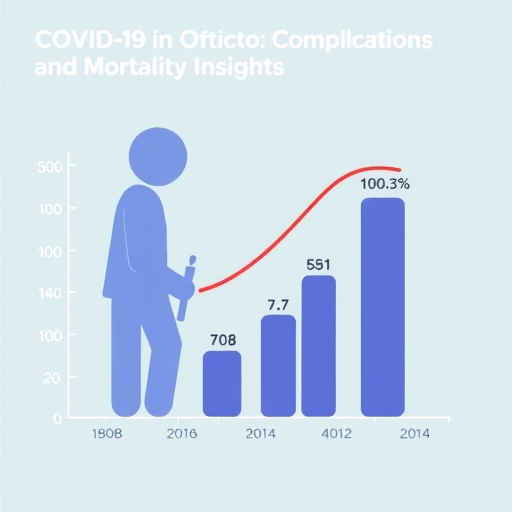The COVID-19 pandemic has profoundly impacted global health, particularly among the elderly population. As the virus continues to pose significant challenges, a new study sheds light on the clinical characteristics, complications, and mortality risk associated with COVID-19 in hospitalized octogenarian patients. The research, led by Arroyo-Huidobro and colleagues, offers critical insights that could influence future treatment and care strategies for this vulnerable age group.
This study stands out not only for its focus on octogenarians but also for its ambispective design, combining both retrospective and prospective elements. Such an approach allows researchers to gather comprehensive data. The authors meticulously analyzed the clinical outcomes of elderly patients who were hospitalized due to COVID-19, aiming to identify specific characteristics that could predict complications or mortality. This understanding is essential, as older adults often present unique health challenges and comorbidities that exacerbate the severity of viral infections.
One significant finding of the study is the prevalence of underlying medical conditions among the patients. Many of the octogenarians presented with comorbidities such as hypertension, diabetes, and cardiovascular diseases. These pre-existing health issues not only complicate the clinical management of COVID-19 but also increase the likelihood of severe outcomes. The study emphasizes the need for healthcare providers to conduct thorough evaluations of these patients, considering their complex medical histories when developing treatment plans.
In addition to comorbidities, the researchers identified specific clinical signs and symptoms that could serve as red flags in elderly patients with COVID-19. For instance, symptoms like confusion, severe respiratory distress, and elevated inflammatory markers were significant predictors of poor clinical outcomes. This information is critical for healthcare professionals, as it can guide timely interventions and possibly improve survival rates among hospitalized octogenarians.
Furthermore, the research highlights the importance of early detection and treatment interventions tailored to the elderly population. The study advocates for vigilant monitoring of high-risk patients and recommends implementing protocols that prioritize rapid access to critical care resources. As healthcare systems continue to navigate the complexities of the pandemic, these recommendations are vital for optimizing care for older adults.
The study also addresses the role of vaccination in mitigating the risks associated with COVID-19 in the elderly. With effective vaccines now available, the researchers argue for their increased uptake among octogenarians, given the substantial evidence supporting their efficacy in reducing severe disease and mortality. Vaccination should be a cornerstone of any comprehensive strategy to protect this vulnerable population from the severe effects of COVID-19.
The implications of this research extend beyond immediate clinical care. With the increasing aging population, understanding the factors that contribute to poor outcomes in octogenarians could inform public health policies. The authors urge policymakers to prioritize resources and tailor health programs that address the specific needs of the elderly. This could include enhanced access to vaccinations and investigations into long-term care options for those impacted by severe cases of COVID-19.
As the world grapples with recovering from the pandemic, lessons learned from studies like this one will be invaluable. By understanding how COVID-19 uniquely affects older adults, healthcare systems can improve their response strategies and outcomes. This research serves as vital groundwork for future inquiries into the lasting impacts of COVID-19 on aging populations.
In the realm of chronic disease management, this study emphasizes the importance of integrated care approaches. Healthcare providers are urged to collaborate across disciplines, ensuring that geriatric specialists are involved in the management of octogenarians with COVID-19. This team-based approach can enhance the overall quality of care, potentially leading to better health outcomes for this population.
Furthermore, the study opens the door for further exploration of the psychological and social effects of COVID-19 on octogenarian patients. The pandemic has not only posed physical health challenges but has also significantly impacted the mental well-being of older adults. Research into the psychological ramifications could pave the way for comprehensive care models that address both physical and emotional health needs.
As the researchers conclude, continued investigation is necessary to deepen the understanding of COVID-19’s impact on octogenarians. Future studies should explore long-term outcomes and recovery patterns in those who survive hospitalization. Investigating the interplay between social determinants of health and COVID-19 outcomes will be crucial for developing effective interventions tailored to this age group.
In summary, the findings from this essential research underscore the urgency of addressing COVID-19’s effects on hospitalized octogenarians. By identifying clinical predictors of complications and mortality, healthcare providers and policymakers can better prepare to protect the most vulnerable segments of the population in times of crisis. The study by Arroyo-Huidobro and colleagues serves as a clarion call for immediate and sustained action to safeguard the health and well-being of the elderly during and after the pandemic.
The challenges presented by the pandemic have been manifold, and as we advance into a post-COVID world, the insights gained from such studies will be paramount. Implementing findings from research is crucial in developing a healthcare system that is resilient, responsive, and well-prepared to meet the needs of aging populations, ensuring that the lessons of today lead to better outcomes tomorrow.
As we reflect on the complexities of aging and the pandemic’s implications, it is essential to forge a path forward that prioritizes the health of our elderly citizens. By taking proactive measures, we can honor the lessons learned throughout this crisis and work toward building a healthier and more equitable future for generations to come.
Subject of Research: Clinical characteristics and predictors of complications and mortality in hospitalized octogenarian patients with COVID-19.
Article Title: Correction: Clinical characteristics and predictors of complications and mortality in hospitalized octogenarian patients with COVID-19: an ambispective study.
Article References:
Arroyo-Huidobro, M., Fontanet, N.P., Cordomí, C.T. et al. Correction: Clinical characteristics and predictors of complications and mortality in hospitalized octogenarian patients with COVID-19: an ambispective study.
Eur Geriatr Med 16, 1559 (2025). https://doi.org/10.1007/s41999-025-01249-1
Image Credits: AI Generated
DOI: 10.1007/s41999-025-01249-1
Keywords: COVID-19, octogenarians, mortality, comorbidities, vaccination, healthcare, elderly care, pandemic response.




